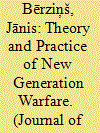| Srl | Item |
| 1 |
ID:
175644


|
|
|
|
|
| Summary/Abstract |
By employing well-known methods of warfare, but in innovative ways and with the help of new technologies, Russia’s concept of operations in Crimea and Eastern Ukraine took many in the West by surprise. Almost immediately, Western analysts embarked on a search for definitions for this ‘new’ approach, most of them within the West’s own theoretical framework. These have included the Gerasimov Doctrine, hybrid warfare and hybrid threat, non-linear warfare, fourth-generation warfare, and most recently ‘gray zone’ conflict. Nevertheless, a vast volume of Russian theoretical debates about new ways of warfare has remained under-studied. This has resulted in misconceptions in the characterization of Russian strategy, through molding it to fit Western theoretical constructs as opposed to those within which it was developed. Rather than helping assess the real options open to Russia, each of the aforementioned terms has tended to be unhelpful, as none reflects Russia’s doctrine or assumptions about the nature of war in the 21st century. This article’s main aim is to describe the Russian way of ‘sub-threshold warfare’ as defined by Russia itself. This was done by researching more than 30 years of Russian military literature, case studies from Crimea and Eastern Ukraine built from interviews with Ukrainian military and security personnel, and information on the Syrian case based on Russian sources. An analysis of the Russian military literature when compared to the empirical evidence of Russian tactics in Ukraine and Syria shows that its strategy is multi-layered and comprehensive. It is counterproductive to frame the Russian strategy within artificial frameworks established outside of the threat context, such as Hybrid Warfare. The Russians have their own framework that, although influenced by Western military doctrine, is the result of their own theoretical developments.
|
|
|
|
|
|
|
|
|
|
|
|
|
|
|
|
| 2 |
ID:
185765


|
|
|
|
|
| Summary/Abstract |
In the twenty-first century we have seen a shift toward blurring of the lines between the states of war and peace. As we move ahead, we will witness more conflicts and not total all-out wars. The emphasis on achieving outcome of conflicts through non-military means is the new normal. This article examines if we are prepared for that and how should we go about it.
|
|
|
|
|
|
|
|
|
|
|
|
|
|
|
|
| 3 |
ID:
178529


|
|
|
|
|
| Summary/Abstract |
This article critically examines how the hybrid warfare concept informs Russian academic and policy debate and how it impacts Russian political and military practice. It explains how the concept of hybrid warfare correlates with the concept of new generation warfare in shaping two vectors in the Russian military policy. The analysis of Russian strategic discourse on hybrid warfare paired with the analysis of some trends in the Russian policy-making argues that the notion of hybrid warfare has become embedded in the thinking of the elites and is now operationalized, including in domestic politics.
|
|
|
|
|
|
|
|
|
|
|
|
|
|
|
|